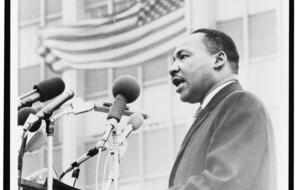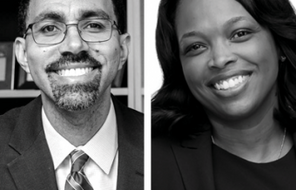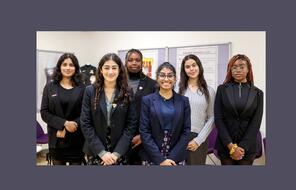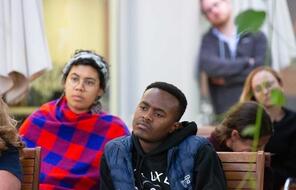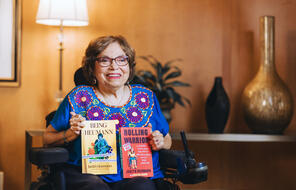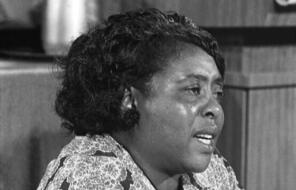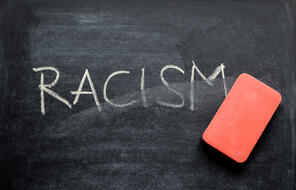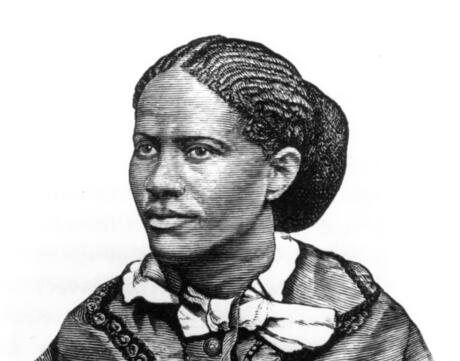
Black Woman Personhood and the Fifteenth Amendment
On February 26, 1869 the United States Congress passed a resolution that proposed a significant change to who was allowed to vote. The key text of the resolution stated, “The right of citizens of the United States to vote shall not be denied or abridged by the United States or by any State on account of race, color, or previous condition of servitude—” 1 . Three-fourths of the states ratified the proposal by 1870, making this resolution the Fifteenth Amendment to the Constitution.
The text of the Fifteenth Amendment explicitly states that the right to vote could not be “denied or abridged” based on race, granting suffrage to formerly enslaved men—now known as freedmen—after the Civil War. Yet, the text of the Fifteenth Amendment leaves out any mention of gender. The ratification of the Fifteenth Amendment caused significant tension in the intellectual spaces that abolitionists and women’s suffrage activists had been occupying together. Though we know that the vast majority of women in the United States did not have the right to vote before the ratification of the Nineteenth Amendment in 1920 2 , the ratification of the Fifteenth Amendment was a key moment in considering the intersections of race and gender in the United States.
In our Reconstruction lesson entitled The Struggle over Women’s Rights we take a closer look at the voting rights debate at the conclusion of the Civil War. White women activists such as Elizabeth Cady Stanton, Lucretia Mott, and Susan B. Anthony were discouraged that the Fifteenth Amendment would not include women’s suffrage. They argued, sometimes in crude and racist ways, that they deserved the right to vote before freedmen. They were angered that educated and wealthy white women would have to continue to wait for the right to vote.
Black women were largely left out of these polarizing suffrage debates. The fact that they were both Black and women meant that the conversation around suffrage was incomplete without acknowledging the struggles of their daily lives. For Black women like Frances Ellen Watkins Harper, an African American poet and activist, race and gender were intertwined when understanding injustice. This concept, later labeled intersectionality by Kimberlé Crenshaw, describes the ways in which social categories such as class, gender, and race overlap and create elevated systems of oppression.
In 1866, as the debate around suffrage after the Civil War intensified, Harper gave a speech at the Eleventh National Women’s Rights Convention in New York City entitled “We are all bound up together.” Harper argued that the voting rights championed by the white women at the convention were inadequate to right the wrongs that Black women experienced in their daily lives. She used her own life as a poignant example of the challenges that Black women confronted. After the unexpected death of her husband, Watkins needed to care for her children while dealing with debt and the loss (repossession) of her home. She says of this moment in her life:
“Had I died instead of my husband, how different would have been the result! By this time he would have had another wife, it is likely; and no administrator would have gone into his house, broken up his home, and sold his bed, and taken away his means of support…. I say, then, that justice is not fulfilled so long as woman is unequal before the law.” 3
Crucially, Harper used her time at the podium to speak of securing rights and privileges of citizenship that went beyond voting. She called for the dignity of Black women as she urged her listeners to avoid complacency. She spoke to the dehumanization that Black women faced and described the humiliating difficulties that Harriet Tubman experienced while traveling.
“We have a woman in our country who has received the name of “Moses,” not by lying about it, but by acting it out—a woman who has gone down into the Egypt of slavery and brought out hundreds of our people into liberty. The last time I saw that woman [Tubman], her hands were swollen. That woman who had led one of Montgomery’s most successful expeditions, who was brave enough and secretive enough to act as a scout for the American army, had her hands all swollen from a conflict with a brutal conductor, who undertook to eject her from her place. That woman, whose courage and bravery won a recognition from our army and from every black man in the land, is excluded from every thoroughfare of travel. 4
Harper knew that the Fifteenth Amendment was a start to granting the rights and privileges of full citizenship for women, but believed that the fight for women’s suffrage would be insufficient for Black women to live freely in the aftermath of the Civil War. She insisted that more work needed to be done to eliminate the hardships that Black women faced. True equality for Black women would require a recognition of their status as freedpeople as well as their womanhood.
- 1The House Joint Resolution Proposing the 15th Amendment to the Constitution, December 7, 1868; Enrolled Acts and Resolutions of Congress, 1789-1999; General Records of the United States Government; Record Group 11; National Archives.
- 2The history of women’s suffrage in the United States is more complex than the text suggests. Some states allowed white women to vote before 1920, Native American women would not be granted the right to vote until 1924, Asian American women were largely unable to naturalize and vote until 1952, and Black Southern women did not receive full suffrage until the passing of the Voting Rights Act in 1965. For more information on voting rights, see this timeline from the Center for Civic Education.
- 3Facing History & Ourselves, "Speech by Frances Watkins Harper: “We Are All Bound Up Together”," last updated September 1, 2022.
- 4Facing History & Ourselves, "Speech by Frances Watkins Harper: “We Are All Bound Up Together”," last updated September 1, 2022.


